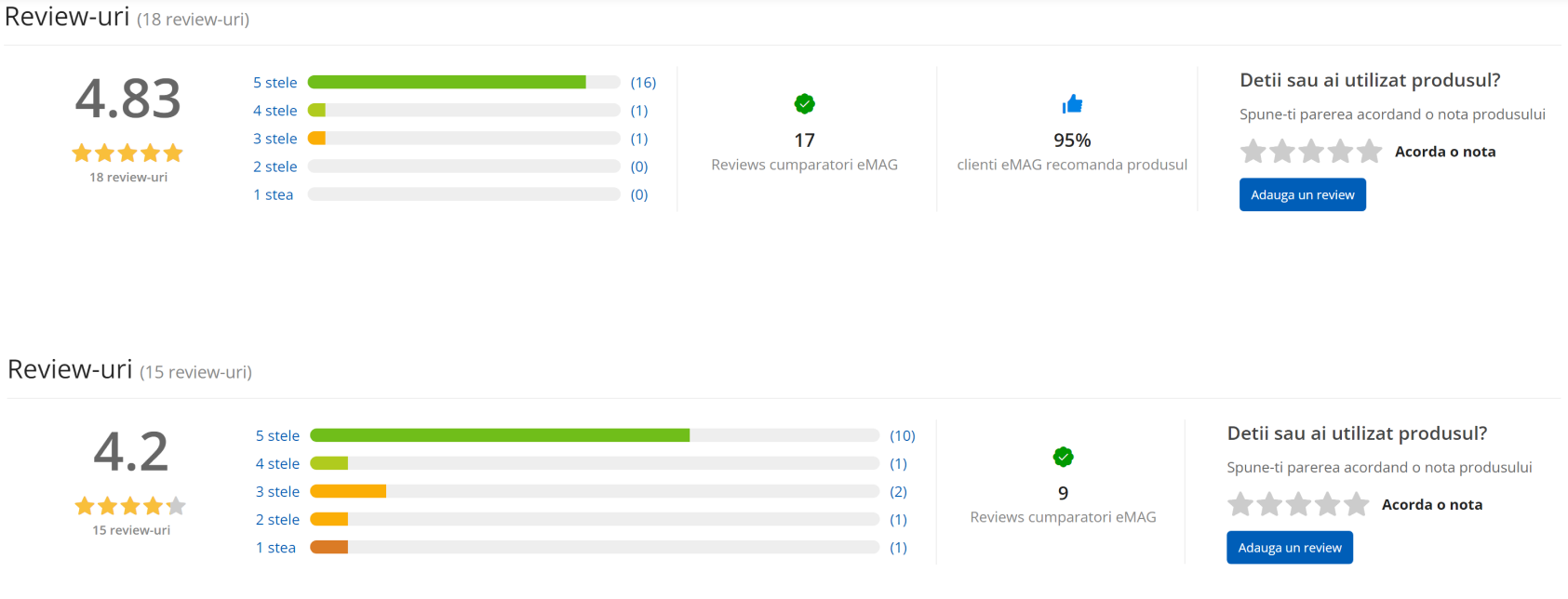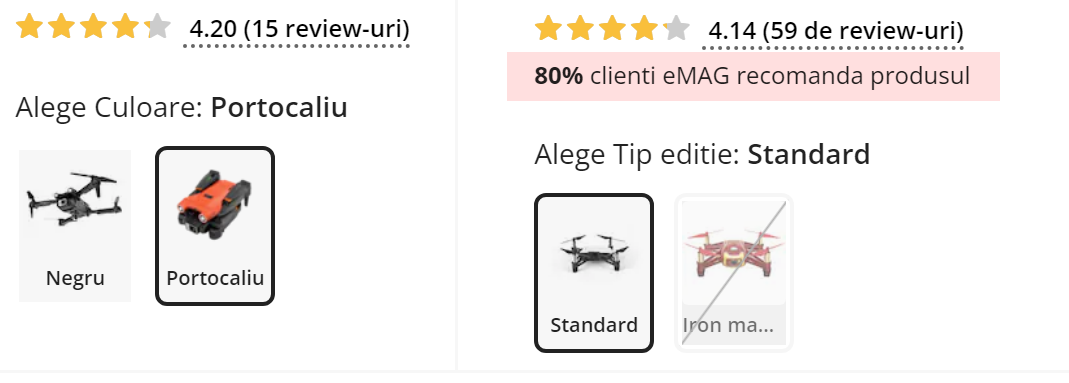eMag: The Deception
An online store allowing individuals to submit reviews for items they haven't purchased!
January 2023, Bucharest

eMag is a company founded in 2001 by Romanian entrepreneurs, and later expanded in Bulgaria, Hungary and Poland. South Africa-based Naspers media group acquired a 70% stake in eMAG in 2012. As one of the biggest online retailers in Southeastern Europe, eMag employed throughout the years a number of unfair practices, not only towards its competitors, but mostly to their end users.
In March 2015 the Bulgarian Commission for Protection of Competition has imposed a fine in the amount of BGN 137,887 to eMAG (Bulgaria) for using unloyal client attraction practices. This has not been the first fine that www.emag.bg has received. The company had suffered a BGN 500, 000 fine previously on account of its Black Friday campaign.
Following an investigation started in 2017, the Hungarian competition authority found that between January 2013 and June 2019, eMAG (Hungary) abused its dominant position on its online platform eMAG Marketplace by positioning and displaying its own products more favourably, to the detriment of offers from partners with which it was in direct competition. eMag company acknowledged the findings and benefited from a reduction of the initial $6.7 million euro fine.
In June 2023, the company was fined EUR 40,000 for infringements related to data subject rights. This is rather interesting as it falls under the domain of end user interaction with their website. According to the article in GDPRHUB the Hungarian website of eMag received three different data subject requests:
Account deletion Data erasure Data modification
Interacting with the website and its support team in situations like unsubscribing from a service or deleting an account can be perplexing, especially when dark patterns are being employed.
I'll dedicate a separate post to share my own experiences, where the support team declined the account deletion request on the grounds of retaining user activity for accounting purposes, or faced a convoluted flow where the unsubscribing required going through the login process to untick marketing communication options (which poses challenges when password details were forgotten).
However, the current post pertains the eMag (Romania) website: www.emag.ro . Given the tainted reputation of the eMag Marketplace, it comes as no surprise to discover that the website's review section allows anyone who owns or has utilised a particular product to create and submit an assessment/opinion on it.
On eMag (Romania) website, the ability to submit a review extends beyond individuals who have purchased the product. The deliberate implementation of this feature is intended to enable the posting of misleading reviews, potentially influencing sales.
Standard online review process and attributes
Many of us are accustomed to the usual process of writing a review:
◉ You make a purchase;
◉ You receive the product(s);
◉ A few days or weeks after the product is delivered, you may receive an invitation to write a review, or you can log in to the website and submit your feedback;
◉ In cases where it's a one-time shopping experience without creating an account, a reputable website will send you a unique link to comment on the purchased item;
◉ Your review is approved and published (assuming it adheres to the guidelines indicated by the online vendor).

In every instance I'm aware of, submitting a review is typically restricted to products one has purchased. Additionally, a limited timeframe is set, within which the review must be submitted post-purchase. It's only reasonable that reviews cannot be submitted after an extended period of time. Both these conditions should be met for maintaining fairness in the online shopping process.
Typically, an online product review encompasses several elements:
◉ User name (often pre-filled; some websites permit anonymity)
◉ Oveall star rating (usually ranges from 1 to 5 stars)
◉ Separate rating for specific functionalities
◉ Review title
◉ Review details (may include photos/videos)
Having outlined the general agreeement on the structure of online reviews, let's now examine how emag.ro incorporates this framework.
A loose implementation
To post a review on emag.ro, you only need to be registered on the website; there is no prerequisite to purchase the product beforehand.
You can open up the page of a random product, access the reviews section, select a star rating, and click the Add review button.
Do you own or have you used this product? - this is the section heading prompting you to share your opinion about the product.
Whether you give a 1-star or a 5-star review, you can do so without having any knowledge about the specific product. It's important to note that, at least, your review undergoes a moderation process.

The second irregularity you might notice is that the total reviews count (as indicated in the section title) doesn't match the number indicated by the green seal stamp. That is because the former encompasses all reviews - whether from registered emag users or buyers -, while the latter represents reviews exclusively from individuals who have purchased the product. You won't be able to identify the category of individuals who gave positive or negative ratings unless you utilize the specific filters to view the feedback under each star rating.
It could be perceived that certain products receive a different promotional strategy. When faced with the dilemma of comparing two items, where one has a higher star rating but is not recommended by website customers, while the other, with a lower score, is recommended, the decision-making process becomes less straightforward.

We all rely on reviews; they support consumers in gaining product-related information, thereby increasing their confidence during online purchasing. When an eCommerce website uses “open” systems that allow all consumers to submit reviews, they intentionally tampers with the decision-making process of other potential buyers.
Research shows that 93% of consumers say online reviews affect their shopping choices. They increase consumers' awareness about products or impact consumers' attitudes toward products. The absence of reviews for a product or the limited number of them, especially for recently added products, diminishes the usefulness of online reviews and has a direct impact on sales.
www.emag.ro website has implemented this flexible strategy for online reviews, enabling not only themselves, but also their third-party sellers to include fake reviews, influencing buyers' decision.
How to improve?
⌘
◉ A paramount rule for the online reviews feature should be to allow only buyers to submit reviews.
◉ A good practice is to use “closed” systems that limit reviews to verified buyers, thereby decreasing the risk of fake or deceptive reviews.
◉ Implement the online review feature in a consistent way across all your products: displaying additional feedback indicators for specific items may sugest bias toward your own products or those sold by other companies on your platform.
◉ Ensure transparency regarding the website's rating system. It enhances the credibility and authenticity of the reviews.